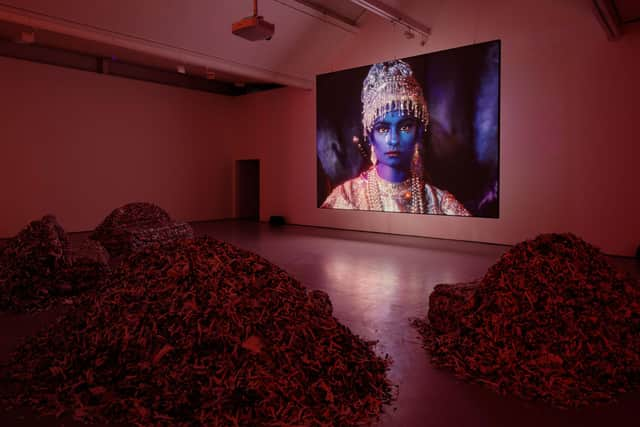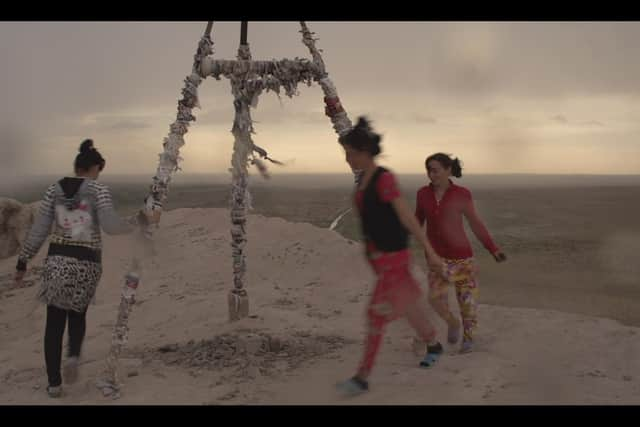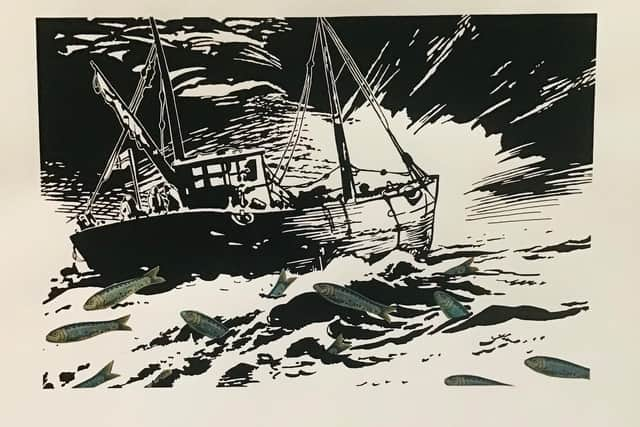Art reviews: Michelle Williams Gamaker | The Scale of Things | MACH2
Michelle Williams Gamaker: Our Mountains are Painted on Glass, Dundee Contemporary Arts ***
The Scale of Things, Cooper Gallery, Dundee ****
MACH2: David and Robert Mach, The Stirling Smith Art Gallery & Museum, Stirling ****
Advertisement
Hide AdThat Hollywood has been guilty of racism and imperialism in years gone by will surprise no one. But what if you happen to love old movies, just hate how they treat people of colour? Sri Lankan-British artist Michelle Williams Gamaker has devised a novel approach to this problem, using the language of vintage Hollywood to reimagine fairer alternatives.
The central work in her show at Dundee Contemporary Arts is Thieves, co-commissioned by DCA and the South London Gallery, the first in a series called Fictional Revenge. Her starting point is The Thief of Baghdad, first made in black and white in 1924, then remade in colour by Michael Powell (who would later be famed for his partnership with Emeric Pressburger) in 1940.
The 1924 film was the Hollywood breakthrough for Anna May Wong, considered the first Chinese American film star, who, despite her icon status, remained frustrated by being cast in marginal roles based on racial stereotypes. Crucially, she was passed over for the female lead in Sidney Franklin’s The Good Earth (1937), about Chinese farmers, in favour of Luise Rainer, a white actress wearing yellowface.
The 1940 Thief also provided a bit part for Sabu, the Indian child star who rose to fame in the title role in Zoltan Korda and Robert J Flaherty’s The Elephant Boy (1937). He, too, struggled to escape stereotypical roles as an adult, and by 1951 was performing with elephants in Tom Arnold’s circus to support his family.


Thieves takes place on the set for Powell’s Thief of Baghdad on which the two actors – played by Gamaker’s collaborators Dahong Wang and Krishna Istha – find each other through time and stage a mutiny, demanding the film is remade with them as romantic hero and heroine.
It lovingly evokes the world of the B-movie, from the too-bright Technicolour and shaky papier-mache sets to the clunky special effects and the general disregard for all non-white cultures. Exhibiting pieces of set, props and costumes by Gamaker and her collaborators adds to the sense of a curtain being lifted on the fantasy. Yet, the “solution” she proposes is no less make-believe. “This fantasy has to end!” shouts Wang, making her ultimatum, but it simply transforms into another one – fairer, but equally ephemeral.
Advertisement
Hide AdThe two shorter films which accompany Thieves are harder-edged. The Bang Straws (2021) sees Dahong Wang/Anna May Wong doing a screen test for the role of O’Lan in The Good Earth and being told she “might only be used as a body double”. The Eternal Return (2019) finds a discontent Sabu working at the circus, and is cleverly cut with old Pathé footage of performing elephants. One is struck by how self-aware the actors were of the obstacles they faced, and the human cost of not being able to realise their ambitions. Even if it doesn’t change anything, then or now, the work at least brings this powerfully to light.
There is more moving image at Duncan of Jordanstone’s Cooper Gallery, with three quite different films brought together in a show curated by Cooper Gallery’s Sophia Hao and Sarah Perks from Teesside University.
Advertisement
Hide Ad

At the centre of The Scale of Things is Margaret Tait’s Aerial, 50 years old this year, a delicate, impressionistic piece just four minutes long. On flickering 16mm, Tait captures two blackbirds on a snowy branch, rich summer foliage, raindrops, earthworms, the four elements – earth, air, fire and water – nailed with the gentlest of touches. The title of the show comes from a poem by Tait.
It sits between two other, longer pieces. The Haunted (2017) by Uzbek filmmaker Saodat Ismailova is beautifully shot in Uzbekistan, an elegy for the Turan tiger, a sub-species native to Central Asia which was made extinct through a mixture of Russian imperialist hunting in the 19th century and destruction of habitat under the Soviets in the 20th. The tiger, which has a spiritual, folkloric significance in the country’s collective imagination, comes to stand for the wider disappearance of languages and cultures under violent colonisation.
Becoming Plant, by British-Kenyan artist Grace Ndiritu, is very different again. The 49-minute film tracks a group of six dancers in a demilitarised industrial site in Belgium who take the psychedelic drug psilocybin, found in magic mushrooms. The film tracks their reactions – sleeping, laughing, hugging – as well as choregraphed routines, while a voiceover by Danish psychiatrist Birgit Bundesen talks about the uses and misuses of psychedelic drugs and how they might actually be helpful in treating today’s “epidemic of mental distress”.
The teasing out of connections between the three films is largely left to the audience. One could say that all three address, in some way, the relationship of humanity and nature and the role of the natural world in helping us make connections with things beyond ourselves. The sense one is left with is that this must be done delicately, with humility and and awareness of our place in the scale of things.


Scale has always been important for the Scottish sculptor David Mach, purveyor of gargantuan installations made of tyres, coat hangers and telephone directories, and of infinitely detailed photo collages and busts made of matches. In many of these works, Mach has been assisted by his brother Robert, who also makes his own work. To kick off a year of celebration for the Stirling Smith’s 150th anniversary, they have made a show together for the first time, MACH2.
Their first joint work, a life-size tiger “gilded” with Tunnocks tea cake wrappers, prowls through the Smith’s art gallery. In amongst the pictures, visitors can discover Mach versions of the Mona Lisa, and a Rembrandt Self Portrait, made with coloured dressmaker’s pins. There is also a Ming vase made of pins and a giant floor-standing vase decorated with Matisse dancers done in sweet wrappers.
Advertisement
Hide AdThe gallery next to the cafe is all Mach, cheerfully mixing works by both artists. Foil sweet wrappers are Robert’s particular field (Tunnocks now supply him by the roll) and he puts them to a range of uses, whether to capture the faces of Bon Scott and Alasdair Gray, to offer his take on Picasso and Miro (“Confectionary Constructivism”) or to make Koons-esque balloon dogs in various colours.
David Mach, whose last show in Scotland was the immense Precious Light at City Art Centre in 2011, presents mainly pin-based work: heads of the Queen, Marilyn, Sean Connery, an impressive suite of 28 vases inspired by the patterns of tropical fish. There’s also an impressive wall of photo collages, many of them referencing Scotland, from the Forth Bridge to the Clydeport Crane.
Advertisement
Hide AdFor all the painstaking workmanship which has gone into both artists’ pieces, there is also a unmistakable sense of two brothers having some fun, whether it’s the clever titles, the subversive act of recasting a masterpiece in sweetie wrappers, or just the pleasure of taking a swing at Scottish kitsch, like the Tunnocks-wrapped stag’s head. It’s pop art with a postmodern twist, inventive, clever, skilled and almost guaranteed to bring a smile to your face.
Michelle Williams Gamaker: Our Mountains are Painted on Glass until 24 March; The Scale of Things until 6 April; MACH2 until 7 April